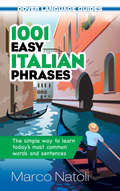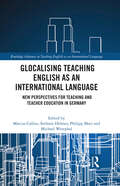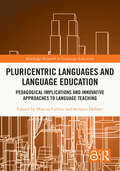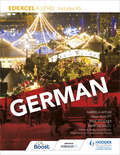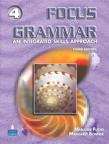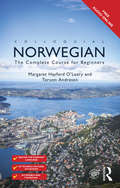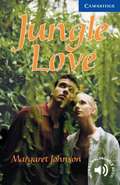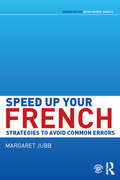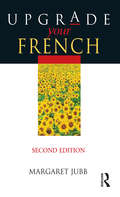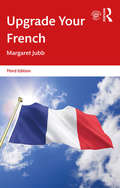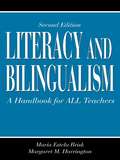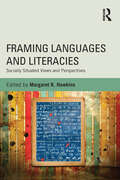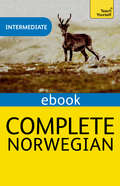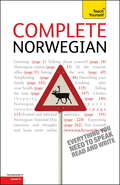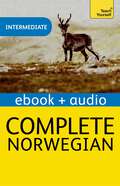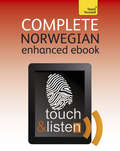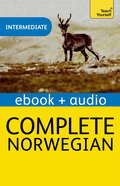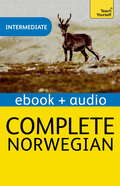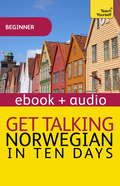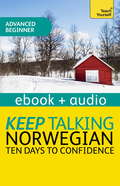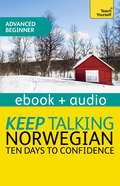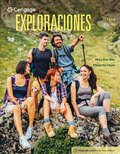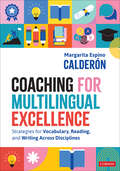- Table View
- List View
1001 Easy Italian Phrases (Dover Language Guides Italian)
by Marco NatoliThe perfect companion for tourists and business travelers in Italy and other places where Italian is spoken, this book offers fast, effective communication. More than 1,000 basic words, phrases, and sentences cover everything from asking directions and renting a car to ordering dinner and finding a bank.Designed as a quick reference tool and an easy study guide, this inexpensive and easy-to-use book offers completely up-to-date terms for modern telecommunications, idioms, and slang. The contents are arranged for speedy access to phrases related to greetings, transportation, shopping, services, medical and emergency situations, and other essential items. A handy phonetic pronunciation guide accompanies each phrase.
Glocalising Teaching English as an International Language: New Perspectives for Teaching and Teacher Education in Germany (Routledge Advances in Teaching English as an International Language Series #3)
by Marcus CalliesThe worldwide spread, diversification, and globalization of the English language in the course of the 20th and early 21st centuries has significant implications for English Language Teaching and teacher education. We are currently witnessing a paradigm shift towards Teaching English as an International Language (TEIL) that aims to promote multilingualism and awareness of the diversity of Englishes, increase exposure to this diversity, embrace multiculturalism, and foster cross-cultural awareness. Numerous initiatives that embrace TEIL can be observed around the world, but ELT and teacher education in Germany (and other European countries) appear to be largely unaffected by this development, with standard British and American English and the monolingual native speaker (including the corresponding cultural norms) still being very much at the center of attention. The present volume addresses this gap and is the first of its kind to showcase recent initiatives that aim at introducing TEIL into ELT and teacher education in Germany, but which have applicability and impact for other countries with comparable education systems and ‘traditional’ ELT practices in the Expanding Circle. The chapters in this book provide a balanced mix of conceptual, empirical, and practical studies and offer the perspectives of the many stakeholders involved in various settings of English language education whose voices have not often been heard, i.e., students, university lecturers, trainee teachers, teacher educators, and in-service teachers. It therefore adds significantly to the limited amount of previous work on TEIL in Germany and bridges the gap between theory and practice that will not only be relevant for researchers, educators, and practitioners in English language education in Germany but other educational settings that are still unaffected by the shift towards TEIL.
Pluricentric Languages and Language Education: Pedagogical Implications and Innovative Approaches to Language Teaching (Routledge Research in Language Education)
by Marcus Callies Stefanie HehnerThis book maps out the pedagogical implications of the global spread and diversification of pluricentric languages for language education and showcases new approaches that can take account of linguistic diversity. Moving the discussion of contemporary norms, aims, and approaches to pluricentric languages in language education beyond English, this book provides a multilingual, comparative perspective through case study examples of Spanish, French, German, Portuguese, Dutch, and Vietnamese. The chapters document, compare, and evaluate existing practices in the teaching of pluricentric languages, and highlights different pedagogical approaches that embrace their variability and diversity. Presenting approaches to overcome barriers to innovation in language education, the book will be of great interest to academics, researchers, doctoral students in the field of language education, as well as socio- and applied linguists. Practitioners interested in linguistic diversity more broadly will also find this book engaging.
Edexcel A level German (includes AS)
by Paul Elliott Marcus Waltl Mariela AffumEndorsed for the Edexcel A-level specification from 2016.Develop all four language skills with a single textbook that has clear progression from GCSE and throughout the new A level.- Clear progression through four stages of learning: transition, AS, A-level and extension- Develops language skills through reading, listening, speaking and writing tasks, plus translation and research practice- Exposes students to authentic topical stimulus and film and literature tasters for every work- Equips students with the tools they need to succeed with learning strategies throughout - Prepares students for the assessment with advice on the new individual research project and essay-writing - Builds grammar skills with exercises throughout and a detailed grammar reference sectionAudio resources to accompany the Student Book can be purchased in several ways: 1) as part of the Dynamic Learning Teaching and Learning resource2) downloaded separately3) as part of the Student eTextbook. The Audio Resources and Teaching and Learning Resources are not part of the approval process.
Focus On Grammar: Level 4
by Marjorie Fuchs Margaret BonnerWith a fresh new design and a host of updated exercises and activities, the popular Focus on Grammar series is more practical and accessible than ever. Known for its focus on English grammar through contextualized listening, speaking, reading, and writing activities, this lively integrated skills course helps students bridge the gap between comprehending grammatical structures and actually using them. Centered on thematic instruction, Focus on Grammar combines controlled and communicative practice in a consistent approach that's a proven success among students at all levels. Each unit progresses through four steps: Grammar in Context, Grammar Presentation, Focused Practice, and Communication Practice, using a unique format that makes the program easy for students to understand - and for teachers to implement. Each Student Book features: * Clear presentations and charts that make grammar easy to learn. * Creative activities that stimulate communication. *New high-interest readings that are rich in content. *From Grammar to Writing sections that build composition skills. *Review Tests to confirm progress and improve scores on standardized tests. *New Internet activities for individual, pair, or group work.
British Sign Language
by Margaret DeucharThis first linguistic study of British Sign Language is written for students of linguistics, for deaf and hearing sign language researchers, for teachers and social workers for the deaf. The author cross-refers to American Sign Language, which has usually been more extensively studied by linguists, and compares the two languages.
Colloquial Norwegian: The Complete Course for Beginners (Colloquial Series)
by Margaret Hayford O'Leary Torunn AndresenColloquial Norwegian provides a step-by-step course in Norwegian as it is written and spoken today. Combining a user-friendly approach with a thorough treatment of the language, it equips learners with the essential skills needed to communicate confidently and effectively in Norwegian in a broad range of situations. No prior knowledge of the language is required. Features include: progressive coverage of speaking, listening, reading and writing skills structured, jargon-free explanations of grammar an extensive range of focused and stimulating exercises realistic and entertaining dialogues covering a broad variety of scenarios useful vocabulary lists throughout the text additional resources available at the back of the book, including a full answer key, a grammar summary and bilingual glossaries Balanced, comprehensive and rewarding, Colloquial Norwegian will be an indispensable resource both for independent learners and students taking courses in Norwegian. Colloquials are now supported by FREE AUDIO available online. All audio tracks referenced within the text are free to stream or download from www.routledge.com/cw/colloquials. Recorded by native speakers, the audio compliments the book and will help enhance learners’ listening and speaking skills.
Jungle Love (Cambridge English Readers #Level 5)
by Margaret JohnsonAward-winning original fiction for learners of English. At seven levels, from Starter to Advanced, this impressive selection of carefully graded readers offers exciting reading for every student's capabilities. On an adventure holiday in the Caribbean, Lisa and Jennifer are sharing a room. They are very different people and do not get on. However, they do have something in common: they are both attracted to Ian. And Ian likes both of them. But what about Ian's girlfriend, Caroline? And then there's Pete and of course, Gary...
Speed up your French: Strategies to Avoid Common Errors (Speed Up Your Language Skills Ser.)
by Margaret JubbSpeed up your French is a unique and innovative resource that identifies and explains the errors most commonly made by students of French. From false friends to idiomatic expressions and the use of prepositions, each of the nine chapters focuses on an aspect of the language where English speakers typically make mistakes. Full explanations are provided throughout with clear, comprehensive examples, enabling students to acquire a surer grasp of French vocabulary and idiom, as well as grammar. Key Features: carefully selected grammar topics and examples based on the most commonly made errors extensive exercises and answer key to reinforce learning, link theory to practice and promote self-study use of mnemonic devices, including visual illustrations, to aid understanding Supplementary exercises and answer key available at www.routledge.com/cw/Jubb Suitable both for classroom use or self-study, Speed up your French is the ideal resource for all intermediate learners of French wishing to refine their language skills.
Upgrade Your French
by Margaret JubbUpgrade your French is the ideal guide for students wanting to rapidly improve their written French. It offers a stimulating thirty day revision programme that is guaranteed to improve your skills. In the countdown to exams, students should simply spend between 30 minutes to an hour a day with this book, and see their mark go up a grade! This short revision guide focuses on three key strategies for improving your written French: - Eliminating common errors and slips of the pen - Increasing and consolidating vocabulary - Encouraging more varied language use The new edition is fully revised and includes a new introduction discussing the essential differences between written and spoken French and a new chapter on comparatives and superlatives. This is the ideal book for all intermediate students looking for a simple way to improve their French fast.
Upgrade Your French
by Margaret JubbUpgrade Your French is the ideal guide for students looking to improve their written French rapidly. It offers a complete revision programme to improve your skills, focusing on three key strategies for improving your written French: Eliminating common errors Increasing and consolidating vocabulary Using a wider range of expression and sentence structure This third edition includes enhanced coverage of the subjunctive and a new section on prepositions, new revision exercises at the end of each chapter (including translation sentences), and a companion website with further practice exercises. This is the ideal book for all intermediate students looking for a simple way to improve their French fast.
Literacy and Bilingualism: A Handbook for ALL Teachers (2nd Edition)
by Maria Estela Brisk Margaret M. HarringtonThis handbook applies proven techniques, derived from bilingual/bicultural classrooms, to teaching literacy in the twenty-first century. Its goal is to help teachers increase their understanding of bilingual learners in order to maximize instruction. Teachers can use this handbook to expand their understanding of literacy and bilingualism; implement literacy approaches and assess students’ development; and learn through reflection. Practical, flexible format and content. Complete and straightforward instructions, illustrated by case studies, allow teachers to use the strategies in this handbook on their own or in teacher-led study groups. They can select from the variety of approaches the ones which best match their students’ needs and their own teaching style. Student-centered focus. All of the approaches share characteristics that help motivate students of varying language abilities to develop literacy. Field-tested approaches. The approaches have been modified and tested with bilingual students of different ages and language backgrounds in bilingual, ESL, mainstream, special education, and deaf education classes ranging from preschool through high school. New in the Second Edition: *five new approaches with their corresponding classroom implementation;*additional information in each introduction addressing its theme;*new material on issues of language, culture, and literacy development of students completely new to the English language; and*annotated bibliographies with sample books to support literacy within language and content area classes. Literacy and Bilingualism is intended for a broad audience of teachers in any type of classroom where bilingualism plays a role, and is an excellent text for preservice and inservice courses that prepare teachers to work with English language learners.
Framing Languages and Literacies: Socially Situated Views and Perspectives
by Margaret R. HawkinsIn this seminal volume leading language and literacy scholars clearly articulate and explicate major social perspectives and approaches in the fields of language and literacy studies. Each approach draws on distinct bodies of literature and traditions and uses distinct identifiers, labels, and constellations of concepts; each has been taken up across diverse global contexts and is used as rationale and guide for the design of research and of educational policies and practices. Authors discuss the genesis and historical trajectory of the approach with which they are associated; offer their unique perspectives, rationales, and engagements; and investigate implications for understanding language and literacy use in and out of schools. The premise of the book is that understanding concepts, perspectives, and approaches requires knowing the context in which they were created, the rationale or purpose in creating them, and how they have been taken up and applied in communities of practice. Accessible yet theoretically rich, this volume is indispensible for researchers, students, and professionals across the fields of language and literacy studies.
Complete Norwegian (Learn Norwegian with Teach Yourself)
by Margaretha Danbolt-SimonsAre you looking for a complete course in Norwegian which takes you effortlessly from beginner to confident speaker? Whether you are starting from scratch, or are just out of practice, Complete Norwegian will guarantee success! Now fully updated to make your language learning experience fun and interactive. You can still rely on the benefits of a top language teacher and our years of teaching experience, but now with added learning features within the course and online. The course is structured in thematic units and the emphasis is placed on communication, so that you effortlessly progress from introducing yourself and dealing with everyday situations, to using the phone and talking about work. By the end of this course, you will be at Level B2 of the Common European Framework for Languages: Can interact with a degree of fluency and spontaneity that makes regular interaction with native speakers quite possible without strain for either party. Learn effortlessly with a new easy-to-read page design and interactive features: NOT GOT MUCH TIME? One and five-minute introductions to key principles to get you started. AUTHOR INSIGHTS Lots of instant help with common problems and quick tips for success, based on the author's many years of experience. GRAMMAR TIPS Easy-to-follow building blocks to give you a clear understanding. USEFUL VOCABULARY Easy to find and learn, to build a solid foundation for speaking. DIALOGUES Read everyday dialogues to help you understand fast. TEST YOURSELF Tests in the book and online to keep track of your progress. EXTEND YOUR KNOWLEDGE Extra online articles to give you a richer understanding of the culture and history of Norway. TRY THIS Innovative exercises illustrate what you've learnt and how to use it.
Complete Norwegian (Learn Norwegian with Teach Yourself): Enhanced Edition
by Margaretha Danbolt-SimonsThis product is most effective when used in conjunction with the corresponding double CD.- You can purchase the book and double CD as a pack (ISBN: 9781444107203)- The double CD is also sold separately (ISBN: 9781444107210)(copy and paste the ISBN number into the search bar to find these products)Are you looking for a complete course in Norwegian which takes you effortlessly from beginner to confident speaker? Whether you are starting from scratch, or are just out of practice, Complete Norwegian will guarantee success!Now fully updated to make your language learning experience fun and interactive. You can still rely on the benefits of a top language teacher and our years of teaching experience, but now with added learning features within the course and online. The course is structured in thematic units and the emphasis is placed on communication, so that you effortlessly progress from introducing yourself and dealing with everyday situations, to using the phone and talking about work. By the end of this course, you will be at Level B2 of the Common European Framework for Languages: Can interact with a degree of fluency and spontaneity that makes regular interaction with native speakers quite possible without strain for either party.Learn effortlessly with a new easy-to-read page design and interactive features: NOT GOT MUCH TIME?One and five-minute introductions to key principles to get you started.AUTHOR INSIGHTSLots of instant help with common problems and quick tips for success, based on the author's many years of experience.GRAMMAR TIPSEasy-to-follow building blocks to give you a clear understanding.USEFUL VOCABULARYEasy to find and learn, to build a solid foundation for speaking.DIALOGUESRead and listen to everyday dialogues to help you speak and understand fast.PRONUNCIATIONDon't sound like a tourist! Perfect your pronunciation before you go.TEST YOURSELFTests in the book and online to keep track of your progress.EXTEND YOUR KNOWLEDGEExtra online articles to give you a richer understanding of the culture and history of Norway.TRY THISInnovative exercises illustrate what you've learnt and how to use it.
Complete Norwegian Beginner to Intermediate Course: EBook: New edition
by Margaretha Danbolt-SimonsDo you want to be able to listen to, speak, read and write Brazilian Portuguese confidently? Do you want the convenience of being able to learn at home or on the move? Whether you are starting from scratch, or are just out of practice, Teach Yourself Complete Brazilian Portuguese – Touch & Listen will guarantee success!Touch & Listen ebooks are a groundbreaking new approach to language learning that include recordings of pronunciation and conversations within the pages of the books themselves – right where you need them.In the past you used to have to juggle separate books and CDs/MP3s to master listening, speaking, reading and writing. Not anymore. Thanks to the latest enhanced ebook technology, you can learn and practise all four language skills plus grammar and vocabulary from a single ebook that you can read and listen to on your tablet device or smartphone. First, touch the on-screen play buttons and listen to native speakers conversing on scores of current topics. Then rewind. Or pause. Whatever you need to do to make sure you’ve fully understood what you have just listened to. When you are ready, complete the activities with the convenient notes feature. You are in control. It’s that simple.STRUCTURE The course is structured in thematic units based on real-life situations and with an emphasis on communication, so that you effortlessly progress from introducing yourself and dealing with everyday situations, to using the phone and talking about work.NOT MUCH TIME? Get started with a 1-minute introduction to the key principles of the language.GRAMMAR Follow easy-to-manage steps to give you a clear understanding of the language.VOCABULARY Use clearly marked lists to make it easy to find and review the most useful vocabulary.DIALOGUES Touch & Listen to everyday dialogues to help you speak and understand fast.PRONUNCIATION Don't sound like a tourist! Perfect your pronunciation before you travel.INSIGHTS Look out for lots of instant help with common problems and quick tips for success, based on the author’s many years of teaching experience.FEATURES Make full use of the wealth of convenient ebook features, including highlighting, making notes and a built-in dictionary.PROGRESS Rise to Level B1 of the Common European Framework for Languages: Can deal with most situations likely to arise whilst travelling in an area where the language is spoken. Can describe experiences and events, dreams, hopes and ambitions.TEST YOURSELF Use the unit tests to keep track of your progress.Teach Yourself Complete Brazilian Portuguese Enjoy the familiarity of a book with the convenience of Touch & Listen technology at home or on the move, and let Teach Yourself and its highly experienced authors guide you every step of the way.
Complete Norwegian Beginner to Intermediate Course: EBook: New edition
by Margaretha Danbolt-SimonsDo you want to be able to listen to, speak, read and write Norwegian confidently? Do you want the convenience of being able to learn at home or on the move? Whether you are starting from scratch, or are just out of practice, Teach Yourself Complete Norwegian – Touch & Listen will guarantee success!Touch & Listen ebooks are a groundbreaking new approach to language learning that include recordings of pronunciation and conversations within the pages of the books themselves – right where you need them.In the past you used to have to juggle separate books and CDs/MP3s to master listening, speaking, reading and writing. Not anymore. Thanks to the latest enhanced ebook technology, you can learn and practise all four language skills plus grammar and vocabulary from a single ebook that you can read and listen to on your tablet device or smartphone. First, touch the on-screen play buttons and listen to native speakers conversing on scores of current topics. Then rewind. Or pause. Whatever you need to do to make sure you’ve fully understood what you have just listened to. When you are ready, complete the activities with the convenient notes feature. You are in control. It’s that simple.STRUCTURE The course is structured in thematic units based on real-life situations and with an emphasis on communication, so that you effortlessly progress from introducing yourself and dealing with everyday situations, to using the phone and talking about work.NOT MUCH TIME? Get started with a 1-minute introduction to the key principles of the language.GRAMMAR Follow easy-to-manage steps to give you a clear understanding of the language.VOCABULARY Use clearly marked lists to make it easy to find and review the most useful vocabulary.DIALOGUES Touch & Listen to everyday dialogues to help you speak and understand fast.PRONUNCIATION Don't sound like a tourist! Perfect your pronunciation before you travel.INSIGHTS Look out for lots of instant help with common problems and quick tips for success, based on the author’s many years of teaching experience.FEATURES Make full use of the wealth of convenient ebook features, including highlighting, making notes and a built-in dictionary.PROGRESS Rise to Level B1 of the Common European Framework for Languages: Can deal with most situations likely to arise whilst travelling in an area where the language is spoken. Can describe experiences and events, dreams, hopes and ambitions.TEST YOURSELF Use the unit tests to keep track of your progress.Teach Yourself Complete Norwegian Enjoy the familiarity of a book with the convenience of Touch & Listen technology at home or on the move, and let Teach Yourself and its highly experienced authors guide you every step of the way.
Complete Norwegian Beginner to Intermediate Course: Enhanced Edition
by Margaretha Danbolt-SimonsComplete Norwegian is a comprehensive ebook + audio language course that takes you from beginner to intermediate level. The new edition of this successful course has been fully revised and is packed with new learning features to give you the language, practice and skills to communicate with confidence. -Maps from A1 to B2 of the Common European Framework of Reference (CEFR) for languages -16 learning units plus grammar reference and word glossary -Discovery Method - figure out rules and patterns to make the language stick -Teaches the key skills - reading, writing, listening and speaking -Learn to learn - tips and skills on how to be a better language learner -Culture notes - learn about the people and places of Norway -Outcomes-based learning - focus your studies with clear aims -Authentic listening activities - everyday conversations give you a flavour of real spoken Norwegian -Test Yourself - see and track your own progress Coming soon: get our companion app. Norwegian course: Teach Yourself is full of fun, interactive activities to support your learning with this course. Apple and Android versions available. Rely on Teach Yourself, trusted by language learners for over 75 years.
Complete Norwegian Beginner to Intermediate Course: Enhanced Edition
by Margaretha Danbolt-SimonsDo you want to develop a solid understanding of Norwegian and communicate confidently with others?Through authentic conversations, vocabulary building, grammar explanations and extensive practice and review, Complete Norwegian will equip you with the skills you need to use Norwegian in a variety of settings and situations, developing your cultural awareness along the way.What will I achieve by the end of the course?By the end of Complete Norwegian you will have a solid intermediate-level grounding in the four key skills - reading, writing, speaking and listening - and be able to communicate with confidence and accuracy. Is this course for me?If you want to move confidently from beginner to intermediate level, this is the course for you. It's perfect for the self-study learner, with a one-to-one tutor, or for the beginner classroom. It can also be used as a refresher course. What do I get?-15 learning units plus verbs reference and word glossary and revision section-Discovery Method - figure out rules and patterns to make the language stick -Teaches the key skills - reading, writing, listening, and speaking -Learn to learn - tips and skills on how to be a better language learner -Culture notes - learn about the people and places of Norway-Outcomes-based learning - focus your studies with clear aims -Authentic listening activities - everyday conversations give you a flavor of real spoken Norwegian-Test Yourself - see and track your own progress *Complete Norwegian maps from Novice Low to Advanced Low level proficiency of ACTFL (American Council on the Teaching of Foreign Languages) and from A1 Beginner to B1/B2 Upper Intermediate level of the CEFR (Common European Framework of Reference for Languages) guidelines. This pack includes a book and one MP3 CD of audio material.What else can I use to learn Norwegian?If you require an absolute Beginner course, you can try our Get Started in Norwegian Absolute Beginner course: 9781473612709Rely on Teach Yourself, trusted by language learners for over 75 years.
Get Talking Norwegian in Ten Days: Enhanced Edition
by Margaretha Danbolt-SimonsWhen travelling, do you want to journey off the English-speaking path, meet people and communicate easily?If so then you need to Get Talking. Through 10 common scenarios plus culture and travel advice, you'll learn the skills for understanding and the confidence to speak Norwegian in just 10 days.Practise the most frequent words and expressions for:-Introducing yourself-Making a telephone call-Arranging to meet-Going to a cafe;-Talking about likes and dislikes-Asking the way-Going to the tourist information office-Going to a chemist-Booking a room at a hotel-Going home.You'll progress in your understanding of naturally-paced conversations, be able to personalize the language through interactive role-plays and perfect your pronunciation to sound more natural.Rely on Teach Yourself, trusted by language learners for over 70 years.
Keep Talking Norwegian Audio Course - Ten Days to Confidence: Enhanced Edition
by Margaretha Danbolt-SimonsIf you already have the basics and want to learn more Norwegian, this advanced beginner audio course will boost your confidence to understand and speak Norwegian.Practise the most frequent words and expressions for:-having an encounter on a plane-arranging to meet-going to the chemist's-meeting the family-sightseeing in Oslo-buying clothes-having lunch at a restaurant-asking for directions-buying a rail ticket-saying goodbye.You'll progress in your understanding by working out language patterns for yourself, personalise your Norwegian with interactive role-plays and perfect your pronunciation to sound more natural.Keep Talking Norwegian - Ten Days to Confidence maps to A1 of the Common European Framework of Reference (CEFR) for languages.Rely on Teach Yourself, trusted by language learners for over 75 years.
Keep Talking Norwegian Audio Course - Ten Days to Confidence: Enhanced Edition
by Margaretha Danbolt-SimonsIf you already have the basics and want to learn more Norwegian, this advanced beginner audio course will boost your confidence to understand and speak Norwegian.Practise the most frequent words and expressions for:-having an encounter on a plane-arranging to meet-going to the chemist's-meeting the family-sightseeing in Oslo-buying clothes-having lunch at a restaurant-asking for directions-buying a rail ticket-saying goodbye.You'll progress in your understanding by working out language patterns for yourself, personalise your Norwegian with interactive role-plays and perfect your pronunciation to sound more natural.Keep Talking Norwegian - Ten Days to Confidence maps to A1 of the Common European Framework of Reference (CEFR) for languages.Rely on Teach Yourself, trusted by language learners for over 75 years.
Exploraciones
by Mary Ann Blitt Margarita CasasEXPLORACIONES transforms students into culturally competent Spanish speakers by providing learning strategies, systematic self-assessments, integration of the National Standards, and a focus on the practical purposes of language study.
Coaching for Multilingual Excellence: Strategies for Vocabulary, Reading, and Writing Across Disciplines
by Margarita Espino CalderonBe the instructional coach multilingual students and their teachers need. As the population of multilingual learners (MLs) in K–12 schools continues to grow, instructional coaches must support content teachers to recognize these students’ assets and address their linguistic, cultural, academic, and social-emotional needs. Leveraging her decades of facilitating and coaching experience in the fields of language, literacy, and professional learning, Margarita Calderón meets this urgent need with practical, evidence-based strategies to leverage the power of coaching in support of ML excellence. Through the individual chapters dedicated to academic language, reading, and writing instruction and strategies to promote student discourse and social-emotional learning embedded throughout, this book will give coaches what they need to guide all teachers toward ML excellence. Additional features include A step-by-step framework designed to help coaches promote teacher efficacy with MLs regardless of program setting or instructional approach Clear guidance for how to structure coaching sessions with teachers, driven by research-based approaches and observation and feedback protocols for accelerating student comprehension Myth-busting facts about the do’s and don′ts of effective coaching for ML success Spotlights on the experiences of veteran coaches focusing on successes, challenges, and tips to remain resilient Individual and group reflection questions and tools at the close of each chapter Offering solutions to the challenges faced by MLs that content area teachers must be prepared to address, this book is a powerful tool coaches can use to move multilingual instruction beyond compliance to excellence.
Coaching for Multilingual Excellence: Strategies for Vocabulary, Reading, and Writing Across Disciplines
by Margarita Espino CalderonBe the instructional coach multilingual students and their teachers need. As the population of multilingual learners (MLs) in K–12 schools continues to grow, instructional coaches must support content teachers to recognize these students’ assets and address their linguistic, cultural, academic, and social-emotional needs. Leveraging her decades of facilitating and coaching experience in the fields of language, literacy, and professional learning, Margarita Calderón meets this urgent need with practical, evidence-based strategies to leverage the power of coaching in support of ML excellence. Through the individual chapters dedicated to academic language, reading, and writing instruction and strategies to promote student discourse and social-emotional learning embedded throughout, this book will give coaches what they need to guide all teachers toward ML excellence. Additional features include A step-by-step framework designed to help coaches promote teacher efficacy with MLs regardless of program setting or instructional approach Clear guidance for how to structure coaching sessions with teachers, driven by research-based approaches and observation and feedback protocols for accelerating student comprehension Myth-busting facts about the do’s and don′ts of effective coaching for ML success Spotlights on the experiences of veteran coaches focusing on successes, challenges, and tips to remain resilient Individual and group reflection questions and tools at the close of each chapter Offering solutions to the challenges faced by MLs that content area teachers must be prepared to address, this book is a powerful tool coaches can use to move multilingual instruction beyond compliance to excellence.
